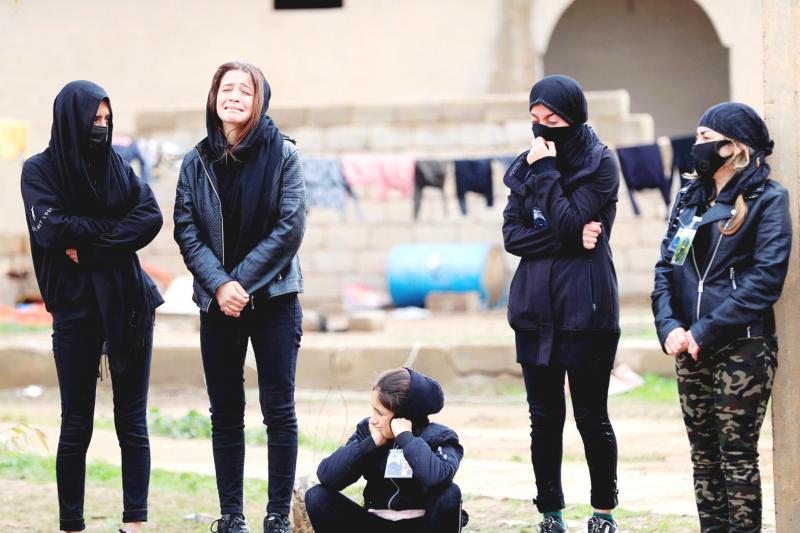For the Yazidi ethnic minority in Iraq, the genocide carried out by the Islamic State (IS) group in 2014 created adversity long before the COVID-19 pandemic did.
For more than six years, hundreds of thousands of Yazidis have been in camps for internally displaced people (IDP) staring at the same four walls of their tents.
They are unable to find work because IS razed their farms and businesses. They cannot reunite with relatives in IS captivity or attend the burials of family members, whose bodies remain in mass graves.

Photo: Reuters
The pandemic has made matters worse.
As countries turn inward to cope with the effects of COVID-19, those on the periphery of protection — the displaced, conflict-afflicted and survivors of sexual violence — are pushed farther into the margins. The consequences of this abandonment are likely to be just as deadly as the pandemic.
These consequences manifest in increased vulnerability to COVID-19 and a sharp decline in mental health. In the first 16 days of this year, 11 young Yazidis took their own lives.
Clustered cases of suicide have been surfacing in IDP camps since the 2014 genocide, but a precise picture of Yazidi mental health trends is muddled by a lack of resources for research and a failure to respond to the issue’s root causes.
There is no doubt that the atrocities perpetrated by IS — including massacres, enslavement, conscription and rape — have inflicted communal and individual trauma.
A study published in 2018 by BMC Medicine found that more than 80 percent of the Yazidi women aged 17 to 75 participating met the criteria for post-traumatic stress disorder. The rates reached nearly 100 percent for women who had survived captivity.
In the absence of adequate support, IS’ violence continues to harm Yazidis, but this is not the only factor exacerbating the community’s vulnerability, as the trauma of genocide is continuously compounded by poverty.
Even before the Yazidi genocide, an International Organization for Migration report identified high rates of suicide in Sinjar, Iraq, which it partially attributed to the lack of economic opportunity, security and religious freedom.
Each of these root problems has been aggravated by genocide, displacement and the pandemic, but efforts to comprehensively address them by sustainably redeveloping Sinjar are deferred and deprioritized time and again by national governments and international agencies.
Non-governmental organization Nadia’s Initiative — founded by human rights advocate Nadia Murad, recipient of the 2018 Nobel Peace Prize — earlier this month met a committee of Yazidis to discuss their needs.
Female survivors were unanimous in their priorities: Foremost was the desire for justice — for courts to try to sentence IS perpetrators for their crimes of sexual violence and genocide.
Trials would serve to hold these criminals accountable. Perhaps more importantly, they would provide a formal acknowledgment of the harm and trauma endured by survivors, and a recognition that the criminality of rape lies with the abuser, not the victims.
The second priority identified by the committee was livelihood support. A handful of organizations offer limited psychological care, but therapy is not a remedy for lack of income, clean water, education and healthcare.
Yazidi survivors see work as a form of therapy. It keeps hands and minds busy, puts food on tables and revitalizes communities. Livelihood opportunities generate hope.
Neither of these priorities is likely to be met until Yazidis can voluntarily and safely return home to a dignified living environment.
The governments of Baghdad and Erbil, the capital of Iraqi Kurdistan, have the ability to restore local governance, security and basic services in Sinjar, but political disputes have undermined durable solutions.
To governments and foreign actors, Sinjar is one piece on a political chess board, but for Yazidis, it is their home, dignity, livelihoods and mental health that are sacrificed for their strategic interests.
The international community must pair on-the-ground support with diplomatic pressure on Iraqi stakeholders for the sake of stabilizing the Sinjar region.
The needs of post-conflict communities have been deprioritized during the COVID-19 pandemic. Their pathways to recovery face insurmountable odds with an international community that often neglects to provide comprehensive support to those most marginalized.

James Watson — the Nobel laureate co-credited with the pivotal discovery of DNA’s double-helix structure, but whose career was later tainted by his repeated racist remarks — has died, his former lab said on Friday. He was 97. The eminent biologist died on Thursday in hospice care on Long Island in New York, announced the Cold Spring Harbor Laboratory, where he was based for much of his career. Watson became among the 20th century’s most storied scientists for his 1953 breakthrough discovery of the double helix with researcher partner Francis Crick. Along with Crick and Maurice Wilkins, he shared the

China’s Shenzhou-20 crewed spacecraft has delayed its return mission to Earth after the vessel was possibly hit by tiny bits of space debris, the country’s human spaceflight agency said yesterday, an unusual situation that could disrupt the operation of the country’s space station Tiangong. An impact analysis and risk assessment are underway, the China Manned Space Agency (CMSA) said in a statement, without providing a new schedule for the return mission, which was originally set to land in northern China yesterday. The delay highlights the danger to space travel posed by increasing amounts of debris, such as discarded launch vehicles or vessel

IMPASSE: US President Donald Trump pressed to end the filibuster in a sign that he is unlikely to compromise despite Democrat offers for a delayed healthcare vote The US government shutdown stretched into its 40th day yesterday even as senators stayed in Washington for a grueling weekend session hoping to find an end to the funding fight that has disrupted flights nationwide, threatened food assistance for millions of Americans and left federal workers without pay. The US Senate has so far shown few signs of progress over a weekend that could be crucial for the shutdown fight. Republican leaders are hoping to hold votes on a new package of bills that would reopen the government into January while also approving full-year funding for several parts of government, but

TOWERING FIGURE: To Republicans she was emblematic of the excesses of the liberal elite, but lawmakers admired her ability to corral her caucus through difficult votes Nancy Pelosi, a towering figure in US politics, a leading foe of US President Donald Trump and the first woman to serve as US House of Representatives speaker, on Thursday announced that she would step down at the next election. Admired as a master strategist with a no-nonsense leadership style that delivered for her party, the 85-year-old Democrat shepherded historic legislation through the US Congress as she navigated a bitter partisan divide. In later years, she was a fierce adversary of Trump, twice leading his impeachment and stunning Washington in 2020 when she ripped up a copy of his speech to the